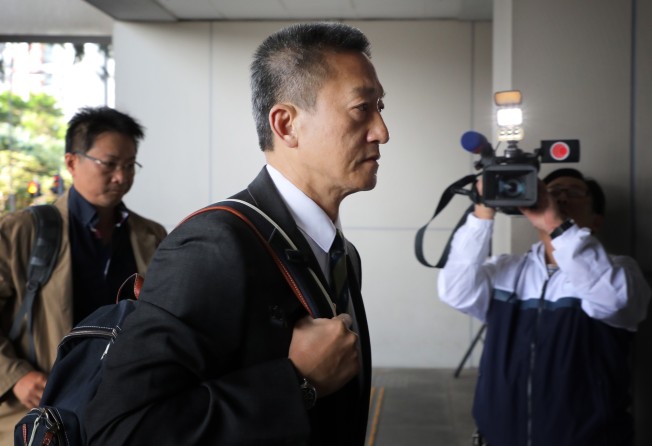‘I should have just let them stay,’ says former top policeman on trial for alleged assault during Occupy protests
Retired superintendent Frankly Chu has second thoughts about leading an operation to clear the streets during protests that paralysed thoroughfares across the city for 79 days

A retired senior police officer on trial for using excessive force during Hong Kong’s 2014 Occupy protests said on Thursday that had he known he would be prosecuted for doing his job, he “should have just let them” stay in the streets.
“Perhaps I should have applied to the Police Force not to take part in the [clearance] operation,” former superintendent Frankly Chu said after 37 years in the force. “Because I was just months away from my retirement.”
The 57-year-old also revealed that he never held any grudges or hatred towards “anyone in the Occupy movement”, which paralysed thoroughfares across the city for 79 days in protesters’ fight for greater democracy.
Chu is facing one count of assault occasioning actual bodily harm after he struck Osman Cheng Chung-hang, 28, allegedly in the neck with a baton outside Shanghai Commercial Bank in the busy shopping district on November 26, 2014.
Chu does not dispute that he hit Cheng, but says his actions did not cross the line into criminal assault.
His second day of testimony not only offered a glimpse into police tactics during the civil disobedience movement but also provided a rare perspective from a frontline commander.
At one point, Principal Magistrate Bina Chainrai asked: “Are we having a lesson in police tactics?”
The Eastern Court heard that the alleged offence took place during a clearance operation in Mong Kok when Chu, then the Sha Tin divisional commander, was leading his company in conducting crowd control.
News footage from that evening shows Chu striking Cheng with a baton after hitting three other people moments earlier.
On Thursday, Chu explained that his main objective at the time was to disperse the crowd outside the bank who were trying to reoccupy the junction at Argyle Street and Nathan Road.
He said he genuinely believed that force was needed and the baton was the “only effective way to combat the situation” because pepper spray would be counterproductive and the only other option was to kick and elbow protesters.
Chu said he only used the baton to hit the bags of the first two people, before he whipped the third person’s waist, and struck Cheng’s back in a downward motion.
“I just happened to see [Cheng] doing an aggressive act towards a police officer,” Chu testified, while leaning his upper body towards his right in demonstration. “I thought that he was challenging us, the police officers, and being non-compliant.”
He admitted he used medium-strength force, but stressed that he never thought of hitting Cheng’s neck because that would be lethal and land him a trial in High Court.
His counsel Peter Pannu then asked: “Do you regret what has happened?”
Chu leaned forward towards the recording microphone and said after a pause: “Had I known that the result of me executing my duty would be like today, that I have to sit here to defend myself …
“If I could choose, I’d rather it be the case that if those people want to occupy the road, I should have just let them.”
Earlier in the day, Chu took the court through events near the junction from his arrival at 7.45pm to the time of the baton hit at about 10.30pm, detailing how the crowds became aggressive.
According to his assessment of the crowd dynamics, the people were hostile and organised, sharing the same united purpose to reoccupy the streets.
The special feature of such a crowd, he said, was that individual feelings and reactions would be affected by the entire crowd, and this mob mentality would result in those in the group committing acts they would not normally dare as individuals.
“The situation in Mong Kok was that many were [at] first bystanders or pedestrians, but in the next second they took part in the charging,” Chu explained. “Therefore in our eyes, or you can say in my judgment, I saw them as a whole, and I could not distinguish who from who.”
Given that police had issued warnings through various channels telling the public how dangerous Mong Kok was, Chu said, “a regular or normal person” should not have gone to Mong Kok or remained in the area.
“But you would still have people who would disregard the warning, for example, whenever you have typhoon signal No 8, people are warned not to go near the waterfront, but people still do it,” the magistrate said in response.
“I agree, some even go windsurfing,” Chu replied. “But these people did that at their own risk. There was a possibility that the person would encounter danger – the situation in Mong Kok was the same.”
“If people knew that the crowd was volatile and still went there, there was a possibility that disturbances might still happen, and they would be caught in the middle if police took action,” he said. “It would be unavoidable.”
The trial was expected to enter its fifth day on Friday with prosecutor Daniel Marash SC cross-examining Chu’s testimony.